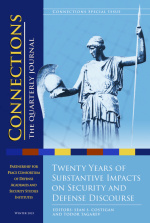This article analyzes the shaping and transformation of the post-Soviet security thinking of Georgia and Ukraine in the context of the post-Soviet Russian foreign policy in the near abroad, often designated as a legitimate sphere of Russian influence, and the competition between Russia and the EU and the US in the region. After the Rose Revolution of Georgia and the Orange Revolution of Ukraine, these two countries’ independent/pro-Western orientation became the main issues securitized by the Russian Federation. Correspondingly, the preservation of territorial integrity became the top security issue for Georgia (since the early 1990s), and it became so for Ukraine after the Crimean occupation (March 2014) and the renewed armed hostilities across the entirety of Ukraine since February 2022. The changes in the internal politics of these countries were transposed into the international competition between Russia and the EU/US, expressed through the clash of “Sovereign Democracy” and “Color Revolution” paradigms for the future of post-Soviet states in the 2010s and transformed into active military measures in Ukraine since 2020s and through the so-called creeping annexation of Georgia since 2010s. Practically, these are the tools of maintaining the Russian influence on the one hand and opposing the Western values and power influence, supported firstly by the European Neighborhood Policy and the Eastern Partnership projects and secondly by granting candidate status to Ukraine in 2022. Russia’s military actions against Georgia (2008) and Ukraine (2014-2023), a response to the soft power applied by the West, aimed at the creation of buffer zones in the shape of “frozen conflicts,” which could be used as indirect leverage in the hands of the Russian Federation to block the Western aspirations of Georgia and Ukraine.
Reviewed article
Competing Strategies: The Russian Federation vs. the European Union and the United States through Georgia and Ukraine
Article statistics
Bibliography
John J. Mearsheimer, The Tragedy of Great Power Politics (New York: W.W. Norton, 2001).
Kenneth N. Waltz, Theory of International Politics (New York: McGraw Hill, 1979).
Christopher Leigh, “Back to the Future? Pre-Soviet History and Political Thought in the Putin Era,” in Post-Soviet Politics: Politics, Foreign Policy and Strategic Competition, October 3, 2013.
Michael Rühle, “NATO Enlargement and Russia: Myths and Realities,” NATO Review, July 1, 2014, https://www.nato.int/docu/review/articles/2014/07/01/nato-enlargement-and-russia-myths-and-realities/
ndex.html
Justin Lynch, “Putin’s Machiavellian Moment,” The Weekly Wonk, July 24, 2014, accessed September, 2014, http://weeklywonk.newamerica.net/articles/putins-machiavellian-moment/
Andreas M. Bock, “Too Blind to See the Threat We Pose to Russia ...,”European Union Foreign Affairs Journal, no. 3 (2014): 45-56, 50.
Thanos Dokos, “How the EU Got It So Wrong in Ukraine,” Friends of Europe, April 24, 2014, https://www.friendsofeurope.org/insights/how-the-eu-got-it-so-wrong-in-ukraine/
Roberto Orsi, “The Irreversible Crisis of the Ukrainian Experiment,” Eurocrisis in the Press Blog (London School of Economics and Political Science, May 12, 2014), https://blogs.lse.ac.uk/eurocrisispress/2014/05/12/the-irreversible-crisis-of-the-ukrainian-experiment/
Vicken Cheterian, “The Big Re-freeze – Has the Regional Balance of Power Merely Cooled into a Different Configuration?” (London: International Institute for Strategic Studies, 2011), accessed May 17, 2011, http://www.iiss.org/programmes/russia-and-eurasia/about/georgian-russian-dialogue/caucasus-security-insight/vicken-cheterian/the-big-re-freeze/
Thomas de Waal, The Caucasus: An Introduction (Oxford University Press, 2010), 166.
Ronald D. Asmus, A Little War that Shook the World: Georgia, Russia, and the Future of the West (New York: Palgrave Macmillan, 2010), 4.
Ronald G. Suny, “Russia has Taken on Its Powerful Competitors for the First Time Since 1991” (London: International Institute for Strategic Studies, 2011), accessed May 17, 2014, http://www.iiss.org/programmes/russia-and-eurasia/about/georgian-russian-dialogue/caucasus-security-insight/ronald-suny/a-watershed-in-east-west-relations/
David J. Smith, “The Saakashvili Administration’s Reaction to Russian Policies Before the 2008 War,” in The Guns of August 2008: Russia’s War in Georgia, ed. Svante E. Cornell and S. Frederick Starr, Central Asia-Caucasus Institute & Silk Road Studies Program Joint Center (New York: Routledge, 2009), 125.
Timothy Frye, “A Tale of Two Russian Narratives,” Perspectives on Peace & Security (Carnegie Corporation of New York, August 2014), https://perspectives.carnegie.org/us-russia/a-tale-of-two-russian-narratives/.
Robert McMahon, “Ukraine in Crisis,” Council on Foreign Relations, updated August 25, 2014, https://www.cfr.org/backgrounder/ukraine-crisis
Andrew Moravcsik, “Europe: The Quiet Superpower,” French Politics 7, no. 3/4 (September-December 2009): 403-422, https://doi.org/10.1057/fp.2009.29
Angela Stent, “Russia and China: Axis of Revisionists?” (Washington, D.C.: Brookings Institution, February 2020), https://www.brookings.edu/wp-content/uploads/2020/02/FP_202002_russia_china_stent.pdf

